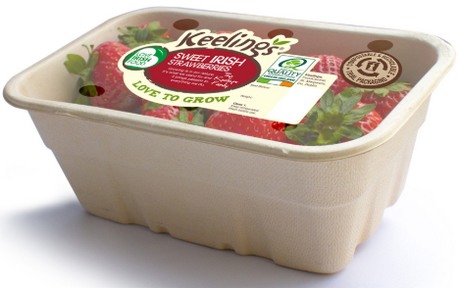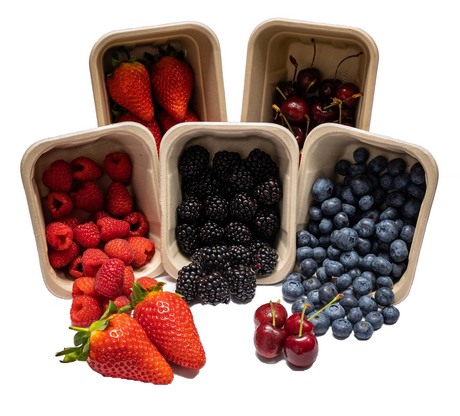Fresh produce packaging supplier Evesham Specialist Packaging Ltd has developed a sugarcane-based packaging which provides major environmental advantages, without reducing the quality of the product.
As it is more expensive to produce, the company explains that the manufacturing process is nothing like what is known in the plastics sector as it is a much slower process. But Sales Manager Paul McReynolds says it is worth it given the major environmental benefits, in that it will break down in the environment in as little as a few months depending on conditions.
"Our trays are made from sugarcane bagasse, which is a fantastic material," Paul said. "Environmentally it is a superb story, made from waste from the sugarcane industry, it is a very sustainable crop which grows within 18 months maximum. The normal process being the crop is harvested, the juices extracted for its intended purpose, and what is left over is bagasse – a bi-waste fibrous material which was headed for landfill or incineration. Rather than burn it and release gasses into the atmosphere, we can make use of this material and it's in abundance".

There are three properties to this type of packaging: it is recyclable, biodegradable and home compostable. The pack is fully recyclable through paper chain and can be part of the general kerbside collection.
Evesham Specialist Packaging (ESP) began its journey into pulp materials when Managing Director Ronan Lynch was approached to provide an alternative to polystyrene stone fruit trays, after successfully developing this over 55 pulp tray footprints have followed for flow wrapped produce such as avocados, stone fruits, top fruits, tomatoes plus many more. As a result, over 7 years ago ESP became a partner in a new business venture called Moulded Fibre Products Ltd (MFP) based in Lincolnshire.
ESP always wanted to develop the sector for heat sealing onto pulp for produce types such as soft fruits, grapes, tomatoes etc and have now patented the process in the UK, Europe and Canada. ESP opted to use the bi-waste material sugarcane bagasse through their strategic Hong Kong partner, it is processed through a paper mill in China into flat sheets, sterilised and the fibres are thermoformed into the required trays and punnets. The totally natural, unbleached, untreated recycled agricultural waste material is in its strongest, longest condition so performs as a virgin material would do (we regard the bagasse as virgin, recycled).

"This packaging creates a completely different environment for the fruit." Paul commented. "Pulp is porous by its nature and allows excellent breathability, along with the material absorbing moisture this results in creating a drier environment.”
In fact, some of the soft fruits, tomatoes and grapes that Evesham Specialist Packaging has worked with has resulted in an extension of shelf-life, which he says was proven through testing involving some of the UK's leading packhouses and independent testing at Lincolnshire University.
"This is important if your packaging is going to be more expensive," Mr McReynolds added. "Obviously the better the quality of fruit used, the better the results - extending shelf life is just one ‘give back’ for the slight extra cost"
The company has global interest in the environmentally friendly packaging in Europe and as far as North America and Dubai, there is capacity to expand and increase supply, given the capabilities of their Chinese manufacturing partner. To put it in perspective, he mentioned that in the UK the company produced 10’s of millions of conventional pulp punnets off 6 machines, while China has much larger capacity for producing thermoformed punnets.
ESP have developed a range of films including recyclable, biodegradable and compostable options giving the grower and retailer the choice. After over a decade of development work on punnet and film we now have various solutions to suit.
For more information:
Paul McReynolds
Evesham Specialist Packaging Ltd
paul@1esp.co.uk
Tel: +44 7825 624 700
www.espulp.co.uk

